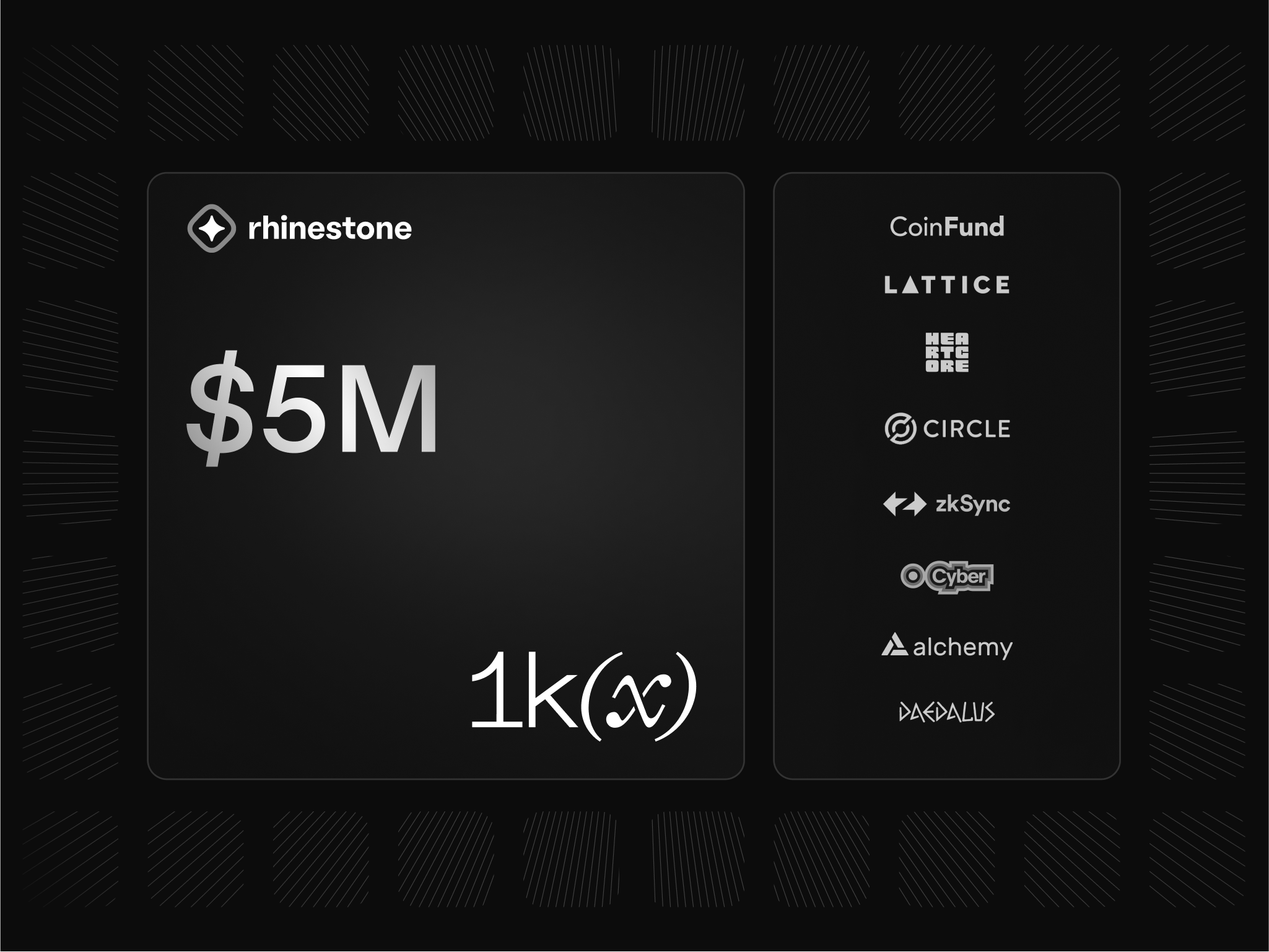$5m Seed Led by 1kx to Unlock the Next Era of Modular Smart Accounts
With participation from CoinFund, Lattice, Circle Ventures, Alchemy Ventures, zkSync, and more
With participation from CoinFund, Lattice, Circle Ventures, Alchemy Ventures, zkSync, and more

We believe that powerful tools for self-sovereign ownership can unlock a new digital era. Rhinestone was founded to empower developers to build onchain products that can onboard the masses. Our thesis is that smart accounts are the platform for achieving this.
Today, we’re excited to announce the close of our $5M seed round, led by 1kx and supported by CoinFund, Lattice, Heartcore, Circle Ventures, Alchemy Ventures, zkSync, and Cyber, as well as angels, including industry leaders from Biconomy, WorldCoin, WalletConnect, Lit Protocol, and Pimlico. We feel blessed to have the support of world-class investors who are vision-aligned and well-equipped to help us go to the next level.
At ETH Denver 2023, we built the first modular ERC4337-compliant smart account in response to the problems we encountered in our early experimentation with account abstraction. These included developer complexity, a lack of simple feature customization, and significant vendor lock-in. The insight was simple: modularize the account and create a means for any developer to easily reuse, build, and customize to unlock innovation at the application layer. Modularity and extensibility remained key design philosophies, even within account abstraction.
Our mission was to enable an open module marketplace, an app store moment for smart accounts, but we quickly discovered many barriers to achieving this. Chief among them were security, interoperability, a lack of developer tooling, and means for developers to monetize. With these new insights, we made an early strategic pivot to stop working on the account and focus entirely on the infrastructure and tooling that will unlock the module ecosystem for all smart account implementations.
Among our earliest supporters were the Ethereum Foundation, which provided a grant to build the Module Registry (an ownerless, verifiable, and transparent solution to module security); Safe, whose account we adopted for our initial infrastructure prototyping; and 1kx, one of the most experienced investors within the crypto wallet stack.
After garnering the support of the top account abstraction companies, we established and co-authored ERC-7579, which is now the leading standard for modular smart accounts. It’s supported by Biconomy, ZeroDev, OKX, Safe, WalletConnect, Etherspot, and others (some unannounced 👀). The community around this standard is growing and continues to strengthen. It will play a big role in ensuring module interoperability, smart account portability, and innovation.
Having established Rhinestone’s foundations, we’ll use this seed round to accelerate the ERC-7579 smart account and module ecosystem by investing in the technology to power the most compelling application use cases. And we’re already getting started, including WalletConnect’s Smart Sessions to revolutionize app UX, ZK Email to improve user privacy, Safe7579 to unleash the Safe app marketplace, chain abstraction solutions for instant cross-chain transactions without bridging, and debit card offerings that can be plugged into any smart wallet.
If you are interested in transforming smart accounts into a platform for open innovation and building the infrastructure to enable the next wave of powerful applications, we’d love to speak with you — we’re hiring!
Account abstraction and smart accounts are still largely misunderstood. Ethereum has two types of accounts: externally owned accounts (EOAs — e.g., MetaMask) and smart contract accounts. EOAs are ‘active’ in that they can initiate transactions on a user’s behalf. Smart contract accounts are ‘passive’ and can only initiate transactions if an EOA triggers them. “Account abstraction” refers to transitioning contract accounts from “passive” to “active,” allowing a smart contract to become the user’s primary account (rather than always requiring an EOA). This is important because smart contracts are programmable (EOAs are not), allowing new features to be written into the account and improving UX and user security. This is necessary if we expect the mainstream adoption of crypto to be the mainstream adoption of digital self-custody.
Gas abstraction is a feature of the transaction infrastructure (ERC-4337) that enables smart accounts to be active. Everything else is a feature of the smart account: batching, multisig, passkeys, etc. These features should be modules, and today’s application developers will be the module developers of tomorrow. If a developer can build a module, they can augment the logic of a user’s account, which opens up a new paradigm for applications.
The verticals we are excited to see experimentation include;
We have also started preparations for the pending Ethereum hard fork, Pectra, which will likely include EIP-7702 and allow smart account features (powered by modules) to apply to all Ethereum users. We’re excited by the product innovation that Rhinestone’s module tech stack and EIP-7702 can unlock for smart account and EOA users.
There are two simple ways to get started with smart account modules today:
In 2023, we saw the launch of ERC-4337, which established a community of early account abstraction innovators. ERC-7579, combined with EIP-7702, will catalyze the web3 app renaissance. Chain Abstraction, session keys to advance UX, and ZK-powered modules for privacy are just the early signs of this. We feel privileged to have the backing of an amazing set of investors and partners to help deliver this vision.
If you’re an app developer building with smart accounts, get in touch. If you are a builder inspired by our vision, we’re hiring.